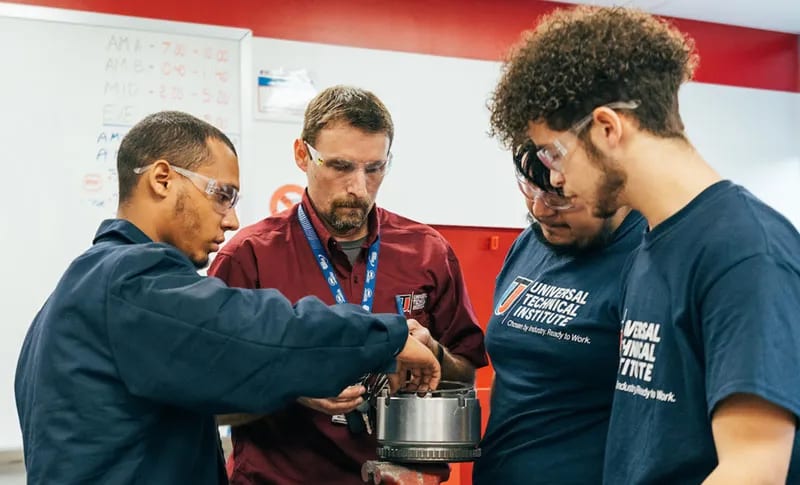The Difference Between College, Trade School and Universal Technical Institute
Thinking about your long-term career goals? Learn about the differences between college and trade school and how UTI differs by reading here!
If you’ve reached a point in your life where you’re trying to decide what your next career move should be, attending a trade school to get an education is an option you could consider.
Opportunities in the skilled trades are everywhere. These workers help keep industries across the country operating smoothly. Trade school is postsecondary education that can offer an alternative to traditional schooling and provide training for those who have a desire to work with their hands.
Universal Technical Institute (UTI) is a great example of a trade school that helps prepare students for careers in the skilled trades, manufacturing and transportation industries.1
Keep reading to learn all about trade school so you can be well informed and make a decision that’s right for you.
Before making any sort of decision, it helps to know more about what trade school is and the purpose it serves. Trade schools are also known as technical or vocational schools and have a focus on teaching students skills for specific careers.
Like other postsecondary education, students who attend trade school need to have at least a GED diploma or a high school education to qualify.
There are several differences between trade school and a traditional four-year college, with one of the biggest being the focused education toward a specific career path that a trade school offers.
Traditional colleges feature required general education classes and other electives that might not relate to a chosen interest or career path.
Trade schools and colleges also differ as far as the learning environment they offer. Typically, students at traditional universities spend large amounts of time in classrooms or lecture halls. Trade school programs also feature classroom learning, but they offer a hands-on component where students can train in labs.18
Trade school can help students prepare for careers in all kinds of industries, from cosmetology to the culinary arts. At UTI, we focus on the skilled trades, manufacturing and transportation industries. Some career paths students might be able pursue after trade school include:77
These are just a few — there are hundreds of career possibilities that a trade school education can prepare you for, depending on your focus.

As mentioned, students often spend less time in trade school than in a traditional college. Based on the amount of time spent, the cost of attending trade school tends to be less than other postsecondary education options.
This goes along with the first point, but you can usually graduate from trade school in less time than a traditional four-year university. Trade school programs are typically two years or less, with many options that allow students to graduate in a year or less. This means you’ll be able to start a career faster.
For hands-on professions, having a background of industry-related training is extremely helpful when applying for jobs. At a trade school like UTI, you’ll be taught by instructors who have real-world experience, and you’ll be able to apply what you learn in the field once you graduate.5
For someone who enjoys working with their hands, a trade school is the place to be. UTI students get to train in our labs with current tools and tech used in the industry, and they learn from instructors who have real-life experience in the field they’re studying.
It’s important to take the time to evaluate what your career goals are when thinking about attending a trade school. Considering the path that makes the most sense for you might include asking yourself questions that include:
These are just a few examples of some questions you might want to consider when deciding whether trade school is right for you. Researching the available options will help you feel more confident when the time comes to make a decision.
Traditional college can make sense for some, but knowing there are alternatives like UTI can make a difference for those interested in pursuing a hands-on career in a shorter amount of time.

At UTI, we’re committed to training the next generation of skilled trade professionals. We currently offer several program options that appeal to a variety of interests:
These programs can help students train for careers as entry-level technicians, welders, CNC machinists, inspectors, service writers and more. Plus, our core programs are designed to be completed in 18 months or less!
Students in the Automotive, Diesel, Motorcycle and Marine programs can also apply for specialized training programs that can allow them to expand their education.15 UTI has relationships with over 35 brands in the industry that help shape these programs!
Different trade schools will have various costs that are specific to the program you choose. UTI also offers specialized training programs that students can apply for to add to their core training that can add additional costs.
However, when comparing costs with a traditional four-year university, students often find that the cost of trade school is more affordable than other postsecondary education. Plus, schools often offer financial aid. UTI’s Financial Aid team, for example, works to help students navigate funding their education, from helping them apply for a Free Application for Federal Student Aid (FAFSA) to exploring scholarship and grant options.10
As mentioned, trade school program lengths can vary depending on what the focus is and what school you’re attending. At UTI, our longest program is designed to be 18 months, while our shortest is 36 weeks (9 months). This shorter time frame allows students to prepare for the field quicker.
This question is subjective, as both trade school and traditional colleges have their purpose, depending on what your goals are. Trade school can be a better route for individuals who know what they want to pursue for a career and who value personalized, hands-on training.
If the idea of attending trade school interests you, exploring the different program options we offer at UTI can help you decide what’s best for you.
Request info today to get in touch with an Admissions Representative who can help answer any questions you may have and walk you through the process of getting started. We’re here to help!
Universal Technical Institute of Illinois, Inc. is approved by the Division of Private Business and Vocational Schools of the Illinois Board of Higher Education.